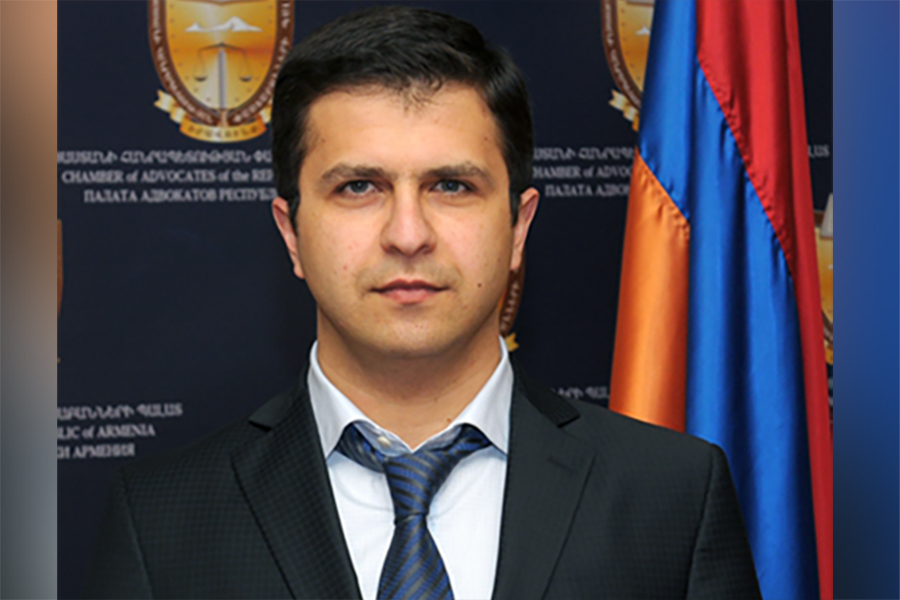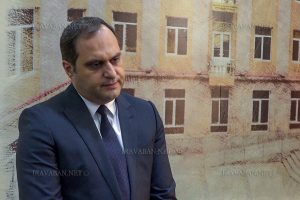The Ministry of Justice has developed a Draft Law “On Making Amendments and Addenda to the Law on Advocacy” within the framework of the strategic direction of the reform of advocacy sector. It has not yet been submitted for public discussion, but was sent to the Chamber of Advocates and all acting advocates for collection of preliminary opinions. Iravaban.net has started a series of interviews, which aims to present the observations and opinions of the advocacy community on the proposed changes.
We talked about the topic with Lawyer Arsen Sardaryan.
– In your opinion, what is the objective for implementing such changes?
– I think that the Ministry of Justice wants to make the institution of advocacy stronger and in line with international requirements. I am convinced that the state institutions that initiate such changes are acting in good faith. But when we familiarize with the draft, it becomes clear that the proposed changes will cause more harm to the legal community. Some individual recommendations are positive, but in general these changes may jeopardize the lawyer’s independence. That is, we may rather harm than help.
I was lucky to communicate with the proponents of the draft. Direct contact with them showed that they are honest, but do not have a deep understanding of this institution. They also do not imagine the problems in our country that the lawyer deals with in his daily activities. To address these issues, we need a strong and united advocacy community, which will respond to the obstacles, encountered during the legal actions of the lawyer and will also support, if necessary.
The advocacy community must be able to ensure the safety of the lawyer in the event of various incidents, beginning with the officials, police officers, in some cases unscrupulous investigators, and other law enforcement agencies, in case of illegal behavior, obstruction of the lawyer’s activity, and humiliation of the lawyer’s activity. When a lawyer sees that he is alone, he may not be able to defend his client’s rights to a high level, even if the lawyer’s legal knowledge is sufficient. The role of our advocacy community in this regard is enormous and important. In terms of internal integrity, the Chamber of Advocates has been transparent and has presented detailed financial reports for the last ten years. I do not imagine there is a problem here.
– One of the proposed changes refers to the review of the role of the Board of the Chamber of Advocates and the Chairman of the Chamber in the executive management relations of the Chamber of Advocates, giving priority to collegial management. How do you feel about this proposed change?
– We have a functioning structure today, which in my opinion is more than collegial. Today, the General Assembly of Advocates decides who should be on the board and who should be elected chairman of the board. If the majority of advocates have empowered individuals to carry out their responsibilities under our current legislation, and if the advocacy community is satisfied with the current regulation, then there is no need for change.
As we know, the election of the Chairman of the Chamber took place recently, and the majority of the current lawyers voted for the current Chairman Simon Babayan. It means that the lawyers have given him that mandate under the current legislation, to represent the Chamber and, if necessary, a specific lawyer, as far as it is in accordance with the law. Why do we deprive him of that mandate with the new regulations, if the legal community does not see such a problem? Moreover, our current president has unique traits of integrity. That is, we have no problem in this regard. In addition, the Board has broader powers, such as deciding to subject a lawyer to disciplinary accountability, overseeing the Chamber’s financial budget, and so on. In other words, the structure that solves the most serious issues is the Board of the Chamber of Advocates, and I do not see a problem with reducing the powers of the Chairman.
I do not think that governance today is not collegial. The Chairman of the Chamber of Advocates has the functions necessary to carry out the activities of the advocacy community effectively. In terms of key issues, the Chairman of the Chamber does not have the authority to pose a problem. For example, the Chairman does not decide whether to hold a lawyer accountable. If there was such a settlement, I would say, let’s change. The Chairman represents the Chamber of Advocates in its relations with other bodies, and it is natural that one person and not fifteen should represent.
–One of the proposals for changes refers to the possibility that the Public Defender’s Office will be able to organize public protection of persons through other persons who are not public defenders. Will the change be appropriate?
– I think that this institution of the Public Defender provides additional guarantees in terms of individual’s rights.
The Public Defender’s Office is funded by the state. In other words, the person is not able to pay and the state pays for him, so that the lawyer can be engaged in protecting the rights of that person. Today, additional examinations are required to be admitted to the Public Defender’s Office, there is a constant monitoring function there. There is a Head of the Public Defender’s Office who responds quickly to requests from citizens, tries to resolve problems, and so on.
If we start to change this institution, we can damage it, but I do not rule out that there may be positive changes here. In general, there is such an international experience that lawyers protect the rights of individuals free of charge, but in this case the person should apply to the preferred lawyer. In other words, there must be a mutual agreement that the lawyer must present the person applying to him/her free of charge. If a person chooses a lawyer who will provide them with free services, he/she should also take into account the quality risk of the services provided. Additional legislative regulations can be developed in this regard. That is, if the specifics of regulating this change are sufficiently developed, we can also consider it a positive change.
– Which of the other changes proposed by the Ministry of Justice are problematic and what are the risks on the way to their implementation?
– For example, the authors of the draft say that people who are not lawyers should be included in the governing institutions of lawyers. I do not think it is necessary. They say that, for example, the disciplinary body is made up only of lawyers, which is currently the Board. Here we have to consider whether there is a problem. Today we put quite high level demands upon the lawyers. Board meetings are recorded and broadcast. That is, when it comes to subjecting a lawyer to disciplinary liability, except for the cases when the lawyer has requested that the process be held behind closed doors, any lawyer can monitor the transparency and legality of the process. There can be no internal problem here and today’s guarantees are enough.
By the way, the issue of disciplinary liability can also be appealed in court. We have had a case where a lawyer used abusive language, the Board decided that he should be held accountable for such behavior, but he appealed to the court and the court ruled that there was no disciplinary violation. Today, the Board’s approach is quite harshly, and our internal integrity is sufficient for these existing institutions to be able to ensure preventing possible misbehavior by a lawyer.
In our case, if a lawyer goes beyond the scope of his/her powers defined by law, the Board will definitely hold him/her responsible. In any case, experience shows that. If our esteemed colleagues bring examples of cases where there have been such cases that went unpunished or where the responsibility was not sufficient, we will say, you are right, other institutions should be involved. We do not have such a problem, but you want to involve people from the ministry, NGOs and other bodies in our advocacy community who will take part in the discussion of subjecting a lawyer to disciplinary responsibility. This is definitely a reduction in the guarantees of independence. The advocacy community can no longer have a monopoly on its internal affairs, provided that the Chamber of Advocates has not abused and has worked in good faith. I consider that we have the task of strengthening the advocacy community at the moment, and there is no apparent need to involve other institutions.
And what are the risks in the way of implementation of changes depends on to what extent the draft will be developed. If the transition provisions are properly regulated, the risks can be neutralized. We have not reached that stage yet, that is, there is no decision yet on whether the proposed changes will be adopted in this format or not. I hope that the Ministry will listen to the positions voiced by the Chamber of Advocates and, taking into account all that, will revise the proposed changes so that the independence of the lawyer does not face risks and dangers, because putting the independence of the lawyer at risk will also jeopardize the protection of the citizen. I believe our state institutions do not want this and I am sure they want to strengthen the defense and adopt the experience of other countries, where the citizen and his rights are really the highest value, as a standard for us,
– Do you associate them with the results of the recent election of the Chairman of the Chamber?
– I do not think there is a political implication here. I am even convinced that there is no such thing. It is just that the people who proposed these changes did not have a deep understanding of the problems facing the Chamber of Advocates and advocates. No problem should be politicized. These issues should be clarified during the dialogue and I am sure that the ministry will change this package in such a way that all doubts will be dispelled.
These changes are not directed against the individual, but for the development of the institution. I think that the final changes in this draft will be in a package that will be acceptable to the majority of advocates, will not violate the level of advocacy and, as a result, the protection of civil rights.
At the moment, I consider unacceptable what is written in the draft, but there are some points in the draft that are positive. I am sure that they will change it and bring it in line with the real problems of advocacy. I believe in that.
Meri Mnoyan


















